2014年新版人教版八年级英语下册《Unit9 Have you ever been to a museum》导学案(第4课时)
英语人教版八年级下册Unit 9 Have you ever be
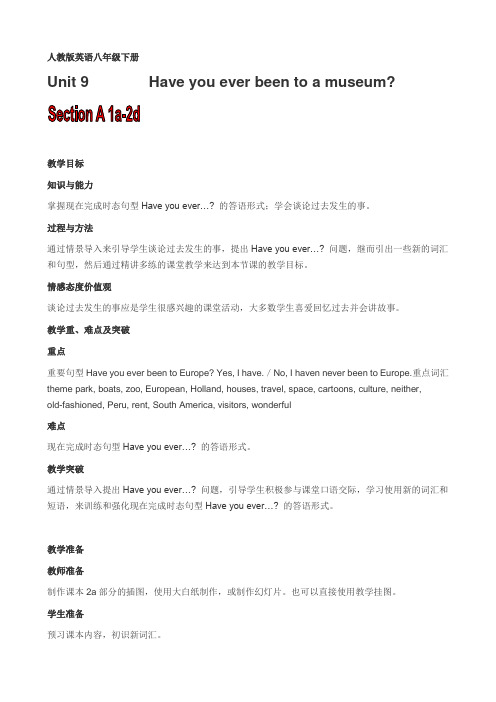
人教版英语八年级下册Unit 9 Have you ever been to a museum?教学目标知识与能力掌握现在完成时态句型Have you ever…? 的答语形式;学会谈论过去发生的事。
过程与方法通过情景导入来引导学生谈论过去发生的事,提出Have you ever…? 问题,继而引出一些新的词汇和句型,然后通过精讲多练的课堂教学来达到本节课的教学目标。
情感态度价值观谈论过去发生的事应是学生很感兴趣的课堂活动,大多数学生喜爱回忆过去并会讲故事。
教学重、难点及突破重点重要句型Have you ever been to Europe? Yes, I have./No, I haven never been to Europe.重点词汇theme park, boats, zoo, European, Holland, houses, travel, space, cartoons, culture, neither,old-fashioned, Peru, rent, South America, visitors, wonderful难点现在完成时态句型Have you ever…? 的答语形式。
教学突破通过情景导入提出Have you ever…? 问题,引导学生积极参与课堂口语交际,学习使用新的词汇和短语,来训练和强化现在完成时态句型Have you ever…? 的答语形式。
教学准备教师准备制作课本2a部分的插图,使用大白纸制作,或制作幻灯片。
也可以直接使用教学挂图。
学生准备预习课本内容,初识新词汇。
教学步骤(第1课时)第一课时教学流程设计教师指导1.情景导入谈论过去发生的事。
2.引导学生进行听力训练。
3.Pairwork小组活动。
学生活动1.谈论过去发生的事。
2.进行听力训练活动。
3.Pairwork小组活动:对话交流和问卷调查。
一、第一教学环节情景导入谈论过去发生的事(约分钟)二、第二教学环节听力训练活动(约分钟)三、第三教学环节Pairwork小组活动(约分钟)四、本课小结引导学生学习Have you ever…? 的答语形式和现在完成时态的用法。
人教版八年级英语下册《Unit 9 Have you ever been to an amusement park.(通用)》教案_1
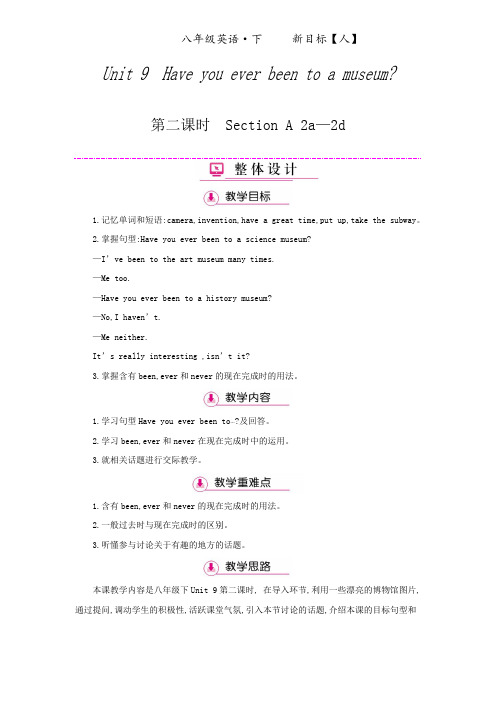
八年级英语·下新目标【人】Unit 9 Have you ever been to a museum?第二课时Section A 2a—2d1.记忆单词和短语:camera,invention,have a great time,put up,take the subway。
2.掌握句型:Have you ever been to a science museum?—I’ve been to the art museum many times.—Me too.—Have you ever been to a history museum?—No,I haven’t.—Me neither.It’s really interesting ,isn’t it?3.掌握含有been,ever和never的现在完成时的用法。
1.学习句型Have you ever been to…?及回答。
2.学习been,ever和never在现在完成时中的运用。
3.就相关话题进行交际教学。
1.含有been,ever和never的现在完成时的用法。
2.一般过去时与现在完成时的区别。
3.听懂参与讨论关于有趣的地方的话题。
本课教学内容是八年级下Unit 9第二课时, 在导入环节,利用一些漂亮的博物馆图片,通过提问,调动学生的积极性,活跃课堂气氛,引入本节讨论的话题,介绍本课的目标句型和单词,在听力环节,注重对学生听力策略的指导,消除学生对听力的“恐惧”心理,让学生能够高效做题。
2d教学是本课综合运用的体现。
通过学习词组、重点句到对话的填空让学生的学习有渐进的过程;抽取学生进行角色扮演,对学生是知识升华的过程。
设计教学PPT,录音机,图片,多媒体。
StepⅠ.Lead in[设计意图]调动学生情感,激活他们头脑中关于过去去过的地方的情感,导入新授。
Leading inT:Boys and girls,do you like traveling?S:Yes.T:Great! Most of you like traveling very much.Me too.Look at the pictures.I went to a lot of places last year.Guess where I went? Use “have/has been to”.S1:You have been to Shanghai.S2:I know you have been to the space museum.S3:You have been to the amusement park.S4:You have been to the zoo.S5:…T:Great! All of you did well.I have been to so many interesting places.Which of these places would you like to visit? Please rank them 1 to 6.space museumhistory museumart museumwater parkzooamusement parkS:…[设计意图]通过情境引入,激发学生情感,便于导入新授内容。
新课标人教版八年级英语下册Unit 9 Have you ever been to an amuse

—So did Tina.
中国地图
蒂娜也去了。
—He has been a soldier for two years.
要点点拨
他已经当了两年兵了。
go inline skating 滑旱冰
—So have I.
我也是。
全析提示
3.Look at the map of the town.Listen and circle the places 助动词 have 和 has 可以与前面的
you hear.
主语缩略’ve 和’s。
看城镇的地图。听录音并圈出你听到的地方。
如:we’ve,they’ve,he’s,
water world 水上世界
it’s 等。
city library 城市图书馆
have not 常缩略为 haven’t,has
fun times amusement park
如果说“欢迎回家”该怎么说呢?
把 1a 中你的回答和你搭档的回答对照一下。
Wele back home!
4.For me,“I have to!” is number two.
对我来说“I have to!”是第二位的。
要点点拨
5.Listen to a teacher interview a student.Circle the newsletter 业务通讯;新闻信札
route“路线、小路、小巷”,使
The main attraction was a Charlie Chaplin film.
用 X 围也较小。course 表示船的
吸引人的主要是查理·卓别林的电影。
“航道”或飞机的“航线”。
The idea of being a teacher has little attraction to young
八年级英语下册Unit_9_Have_you_ever_been_to_museum_讲解+练习题目+答案

Unit9 知识点和练习附详细参考答案1. invent(1)invent 作动词,意为“发明;创造”。
例如:Edison invented the light bulb. 爱迪生发明了电灯。
(2)invent还可以表示“虚构”。
例如:The whole story was invented. 整个故事是虚构的。
(3)invent的名词形式有两个,一个是inventor(发明者;发明家),另一个是invention (发明物)。
例如:Edison is a great inventor in history.爱迪生是历史上伟大的发明家。
Human history is also a history of great inventions.人类的历史也是一个伟大发明的历史。
【拓展】invent和discover的辨析:(1)invent 意为“发明,发明之物”指“从无到有”。
例如:Alexander Graham Bell invented the telephone in 1876.亚历山大•格雷厄姆•贝尔在1876年发明了电话。
(2)discover 意为“发现”,指“本来就已经存在,但不为人知”的事物。
例如:Columbus discovered America in 1492. 哥伦布在1492年发现了美洲。
2. unbelievableunbelievable作形容词,意为“难以置信的;不真实的”,是由believable“可相信的;可信任的”加否定前缀un-派生而来的。
其动词形式为believe,意为“相信;以为”。
例如:It's unbelievable that you are a writer. 我难相信你是一个作家。
【拓展】un-是个前缀,意为“不”。
例如:happy“高兴的”— unhappy“不高兴的”;lucky“幸运的”— unlucky“不幸的”;important“重要的”— unimportant;“不重要的”;healthy“健康的”— unhealthy“不健康的”。
英语人教版八年级下册《Unit 9 Have you ever been to
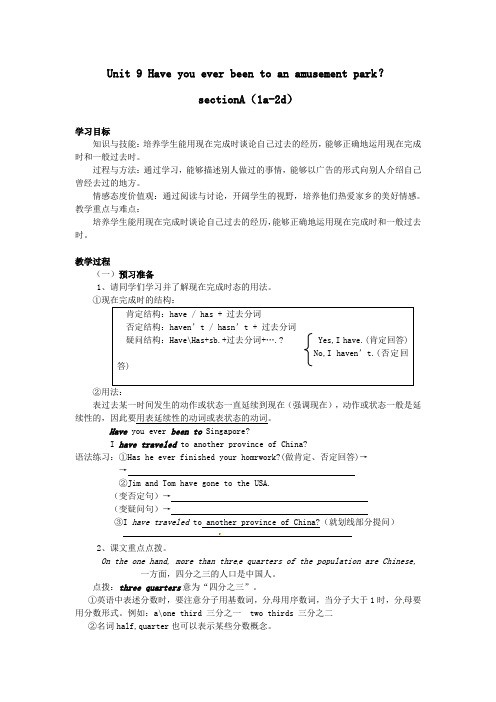
Unit 9 Have you ever been to an amusement park?sectionA(1a-2d)学习目标知识与技能:培养学生能用现在完成时谈论自己过去的经历,能够正确地运用现在完成时和一般过去时。
过程与方法:通过学习,能够描述别人做过的事情,能够以广告的形式向别人介绍自己曾经去过的地方。
情感态度价值观:通过阅读与讨论,开阔学生的视野,培养他们热爱家乡的美好情感。
教学重点与难点:培养学生能用现在完成时谈论自己过去的经历,能够正确地运用现在完成时和一般过去时。
教学过程(一)预习准备1、请同学们学习并了解现在完成时态的用法。
①现在完成时的结构:②用法:表过去某一时间发生的动作或状态一直延续到现在(强调现在),动作或状态一般是延续性的,因此要用表延续性的动词或表状态的动词。
Have you ever been to Singapore?I have traveled to another province of China?语法练习:①Has he ever finished your homrwork?(做肯定、否定回答)→→②Jim and Tom have gone to the USA.(变否定句)→(变疑问句)→③I have traveled to another province of China?(就划线部分提问)2、课文重点点拨。
On the one hand, more than three quarters of the population are Chinese,一方面,四分之三的人口是中国人。
点拨:three quarters意为“四分之三”。
①英语中表述分数时,要注意分子用基数词,分母用序数词,当分子大于1时,分母要用分数形式。
例如:a\one third 三分之一 two thirds 三分之二②名词half,quarter也可以表示某些分数概念。
新课标人教版八年级英语下册Unit 9 Have You Ever Been to an Amuse

Unit 9 Have You Ever Been to an Amusement Park?一、学习目标:1.掌握现在完成时的用法;2.了解一般过去时、现在完成时和现在完成进行时的意义的区别;3.能够准确使用多种时态谈论自己的经历。
二、学习重点难点:1. 现在完成时由主语+have/has+过去分词构成。
其主要用法如下:I.在未指明具体时间的情况下,现在完成时动词通常可以表示在说话之前已经完成,而后果或影响至今仍存在的动作。
例如:The concert has started. 音乐会已经开始。
I have had breakfast. 我已吃过早饭。
注意:have gone to 和have been to 在意义上有区别。
例如:He has gone to Hong Kong. 他到某某去了。
(他已前往某某,或在途中,或已到达。
说话人暗示他现在不在现场。
)He has been to Hong Kong. 他曾到过某某。
(说话人认为他过去到过某某,现在已不在该地。
言外之意他对某某有所了解。
)II. 现在完成时动词可以表示开始于过去持续到现在(也许还会继续进行下去)的动作或状态。
例如:1) I have studied English since last year. 我从去年开始学习英语。
2) She has lived in Beijing for five years. 她住在已经五年了。
注意:e, go , leave, arrive, buy, lose, receive, join, die, bury 和marry 等动词所表示的动作是一时的,不能延续的,故不能与for …,since …等开头的表示一段时间的状语连用。
不过,这些词用于否定句则可以与表示持续的时间状语连用,即动作的不发生是可以持续的。
例如:不能说:*He has e to Beijing for two years.*He has bought that book for three weeks.*He has joined the Army for one and a half years.*His grandma has died for nine months.* I have received his letter for a month.可以说:He has been in Beijing for two years.He has had that book for three weeks.He has been in the army for one and a half years.His grandma has been dead for nine months.I haven't received his letter for almost a month.或者:It is two years since he came to Beijing.It is three weeks since he bought that book.It is one and a half years since he joined the Army.It is nine months since his grandma died.2. 现在完成时把过去的动作和现在的结果联系起来,一般过去时只限于表示过去的动作本身,与现在的结果无关。
英语人教版八年级下册unit 9 Have you ever been ...

.课题:Go For It! 八年级下Unit 9. Have you ever been to an amusement park? (第一课时:听说课)教学目的:1.通过听力训练及对话练习、调查活动等引出第九单元关于现在完成时态的用法。
2.重点操练句型:Have you ever been to…?3.利用多媒体教学,使学生开拓视野,增强学习英语的兴趣。
学生分析:学生已经学过一般过去时态的用法,在Unit6初步接触过现在完成时,但没有接触多媒体课堂环境。
教学步骤:Ⅰ.Watch MTV & Disneyland.Ⅱ.Greetings & Revision.Ⅲ.Presentation:A.Ss learn the new words according to the pictures.B.Show a photo, present the patterns:T: I have ever been to Zimalin Park,but I haven’t been to Beijing.Have you ever been to Zimalin Park?S1: Yes, I have. / No, I haven’t. How about you?T: Me, too. / Me, neither.Ⅳ.Activities:Task 1: Pairwork: Ss talk about if they have ever been tosomewhere, using the pictures. Four pairs act outthe conversations.Task 2:1a-1b.Task 3: Make a survey and have reports.Task 4: Guessing game.Ⅴ.Summary & Homework.。
人教新目标版初中英语八年级下册Unit9Haveyoueverbeentoamuseum要点讲解
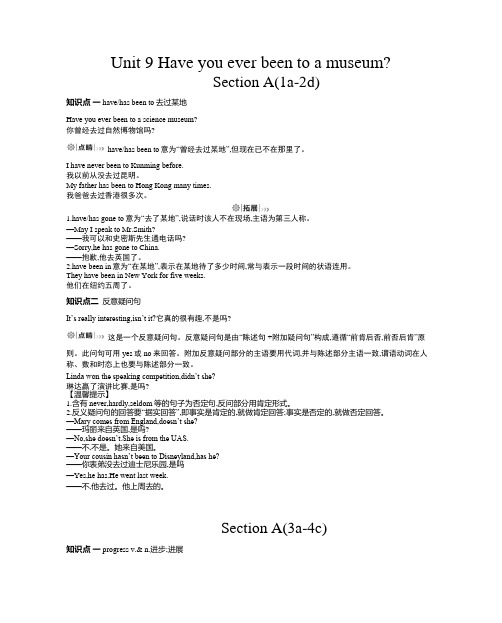
Unit 9 Have you ever been to a museum?Section A(1a-2d)知识点一have/has been to去过某地Have you ever been to a science museum?你曾经去过自然博物馆吗?have/has been to意为“曾经去过某地”,但现在已不在那里了。
I have never been to Kunming before.我以前从没去过昆明。
My father has been to Hong Kong many times.我爸爸去过香港很多次。
1.have/has gone to意为“去了某地”,说话时该人不在现场,主语为第三人称。
—May I speak to Mr.Smith?——我可以和史密斯先生通电话吗?—Sorry,he has gone to China.——抱歉,他去英国了。
2.have been in意为“在某地”,表示在某地待了多少时间,常与表示一段时间的状语连用。
They have been in New York for five weeks.他们在纽约五周了。
知识点二反意疑问句It’s really interesting,isn’t it?它真的很有趣,不是吗?这是一个反意疑问句。
反意疑问句是由“陈述句 +附加疑问句”构成,遵循“前肯后否,前否后肯”原则。
此问句可用yes或no来回答。
附加反意疑问部分的主语要用代词,并与陈述部分主语一致,谓语动词在人称、数和时态上也要与陈述部分一致。
Linda won the speaking competition,didn’t she?琳达赢了演讲比赛,是吗?【温馨提示】1.含有never,hardly,seldom等的句子为否定句,反问部分用肯定形式。
2.反义疑问句的回答要“据实回答”,即事实是肯定的,就做肯定回答;事实是否定的,就做否定回答。
—Mary comes from England,doesn’t she?——玛丽来自英国,是吗?—No,she doesn’t.She is from the UAS.——不,不是。
八年级英语下册Unit9Haveyoueverbeentoanamusementpark词汇详细用法人教新目标版

Unit 9 Have you ever been to an amusement park ?68页1.amusement [ u ] 娱乐、消遣an amusement park 游乐场Have you ever been to an amusement park? 你曾经去过一个游乐场吗?Fun Times Amusement Park 欢乐时光游乐场。
复习have been to 去过,回来了have gone to 去了,现在不在这里have been in 去了,还在那里2. neither① adj. pron 二者都不Neither answer is correctNeither of the answers is / are correct.Which do you like? Neither I think they’re both ugly.② adv. 也不I don’t know. Me neither. I don’t know, either.70页3. Disneyland 迪斯尼乐园(前无冠词)Have you ever been to Disneyland?In fact, there are now several different Disneyland amusement parks around the world. 事实上,现在世界上有好几处不同的迪斯尼游乐场。
around the world = all over the worldacross China = all over China4. Mickey Mouse 米老鼠5. Donald Duck 唐老鸭6. character①性格I know his character very well.②汉字Chinese characters③人物、角色famous characters from Chinese historyDisney characters 迪斯尼人物Mickey Mouse and Donald Duck are famous Disney characters.7. seen see的过去分词。
人教版 八年级英语 下册 Unit_9_Have_you_ever_been_to_a_museum

dish.
Tapescripts:
Boy 1: So, Peter, how long have you been in China? Peter: I’ve been here for two weeks, but I’m going back to Australia tomorrow. Boy 1: Have you traveled much? Peter: Yes, I have. I’ve seen many interesting things. Boy 1: Have you visited the Palace Museum? Peter: Yes, I have. I went there last week. It was wonderful. There were so many beautiful treasures. Boy 1: And have you been to the Great Wall?
1st listening
1b
Listen to a student interviewing a foreign student. Check (√) the questions you hear.
___√_ Have you visited the Palace Museum?
___√_ Have you been to the Great Wall?
人教版八年级英语下册Unit9 Have you ever been to a museum知识点梳理及单元复习
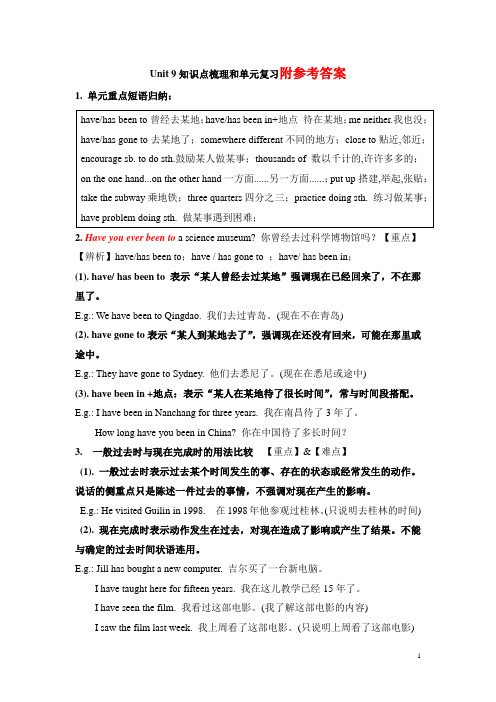
Unit 9知识点梳理和单元复习附参考答案1. 单元重点短语归纳:have/has been to曾经去某地;have/has been in+地点待在某地;me neither.我也没;have/has gone to去某地了;somewhere different不同的地方;close to贴近,邻近;encourage sb. to do sth.鼓励某人做某事;thousands of 数以千计的,许许多多的;on the one hand...on the other hand一方面......另一方面......;put up搭建,举起,张贴;take the subway乘地铁;three quarters四分之三;practice doing sth. 练习做某事;have problem doing sth. 做某事遇到困难;2. Have you ever been to a science museum? 你曾经去过科学博物馆吗?【重点】【辨析】have/has been to;have / has gone to ;have/ has been in;(1). have/ has been to 表示“某人曾经去过某地”强调现在已经回来了,不在那里了。
E.g.: We have been to Qingdao. 我们去过青岛。
(现在不在青岛)(2). have gone to表示“某人到某地去了”,强调现在还没有回来,可能在那里或途中。
E.g.: They have gone to Sydney. 他们去悉尼了。
(现在在悉尼或途中)(3). have been in +地点:表示“某人在某地待了很长时间”,常与时间段搭配。
E.g.: I have been in Nanchang for three years. 我在南昌待了3年了。
How long have you been in China? 你在中国待了多长时间?3. 一般过去时与现在完成时的用法比较【重点】&【难点】(1). 一般过去时表示过去某个时间发生的事、存在的状态或经常发生的动作。
八年级英语下册 Unit 9 Have you ever been to a museum语法专题—

3.—Have you seen Dr.Qian recently? —No.He _C___ Japan for an important meeting.He'll come back next week. A.has gone B.has been to C.has gone to D.has been 4.—Have you __C__ been to Guangxi? —Yes,I have.I ________ there last summer. A.ever;go B.never;went C.ever;went D.never;go
第8页
9.We went to the science museum last week.(对画线部分提问) ___W__h_e_n__d_id___ you __g_o_ to the science museum? 10.My parents have been to the Great Wall.(对画线部分提问) __W__h_e_r_e_h_a_v_e__ your parents__b_e_e_n___?
第9页
三、依据对话内容,用have/has been(to)或have/has gone(to)填空。 A:Hi,Roger! Where is everybody?The house is very quiet. B:Well,Mom 11.__h_a_s__g_o_n_e_t_o____ the cinema with Jane. A:How about your sister? B:She's taking a shower right now because she 12.__h_a_s_b_e_e_n__to__ the gym(健身房). A:I 13._h__a_ve__b_e_e_n_t_o__ the gym twice this week.It's really tiring.
英语八年级下册 Unit9 Have you ever been to a museum单元短语过关

人教版英语八年级下册第九单元短语过关Unit 9 Have you ever been to a museum?1. a science museum 一个科学博物馆2. a space museum 一个太空博物馆3. a history museum 一个历史博物馆4.an art museum 一个艺术博物馆5.water park 水上乐园6.amusement park 游乐场7.somewhere different 某个不同的地方;不定副词,后接形容词;例如:For my next vacation , I ‘d like to go somewhere different. 下次度假,我想去个不同的地方。
st year 去年9.at night在夜晚;at noon在中午10.have \ has been to ... 去过...;例如:I have been to a wonderful placewith big gardens. 我去过一个带有很多花园的美景之地。
have \ has gone to ... 去了;例如:She can’t find Mr. Green , he has gone to Beijing. 她不能找到格林先生,他去了北京。
11.go skating 去滑冰12.take the subway 乘坐地铁13.camp in the mountains 在山上野营;例如:During the summervacation , we camped in the mountains and it was fun. 暑假期间,我们在山上野营,非常有趣。
14.put up the tent 搭建帐篷;put up 还可以表示张贴;例如:They putup their tent and slept under the tree.他们搭建好帐篷,在树下睡了。
八年级英语下册Unit9Haveyoueverbeentoamuseum单元语法知识梳理人教版

Unit 9 Have you ever been to a museum现在完成时(Ⅱ)1.现在完成时表示经历的用法现在完成时常用have been to(去过),ever(曾经),never(从没)等表示经历。
用法说明示例have / has been to表示去过某地,可以与never,ever,just,once等连用。
Mr. Smith has ever been to China three times.史密斯先生曾去过中国三次。
ever常用于现在完成时的一般疑问句中,放在主语之后,过去分词之前。
Have you ever visited the Palace Museum? 你曾参观过故宫博物馆吗?never表示否定,用在助动词have / has之后,过去分词之前。
表示否定的简短回答可以用neither。
—I have never been to Hong Kong.我从来没去过香港。
—Me neither.我也没去过。
2.have/ has been to与have / has gone to的用法区别用法说明示例have/ has been to意为“去过某地”,表示去过某地,现在已经回来了,通常与表示次数的状语连用,如twice,several times,ever,never等She has been to Europe twice.她去过欧洲两次。
(已经回来了)I have never been to the Great Wall.我从未去过长城。
have / has gone to意为“去了某地”,表示到某地去了,强调说话时去某地的人不在场(可能在途中,也可能已到达)。
—Where is Jim? 吉姆在哪里?—He has gone to England.他去英国了。
(现在不在这里)若have/ has been to或have / has gone to后接副词,则省略to。
- 1、下载文档前请自行甄别文档内容的完整性,平台不提供额外的编辑、内容补充、找答案等附加服务。
- 2、"仅部分预览"的文档,不可在线预览部分如存在完整性等问题,可反馈申请退款(可完整预览的文档不适用该条件!)。
- 3、如文档侵犯您的权益,请联系客服反馈,我们会尽快为您处理(人工客服工作时间:9:00-18:30)。
八年级(下)英语导学案
主备人: 授课时间:2014.6 班级: 组别: 姓名:
Topic
Unit9 Have you ever been to a museum? Section B 2a —3a (阅读课)
_____you ever _____Chinese food _____ of_____? 4.你不会有任何问题就能吃到饺子。
You won’t have_____ _____ _____dumplings. II. While-class
a.检查2a ,让学生自由谈论关于新加坡的一些风土人情。
b.用屏幕展示新单词及短语,学生跟读并记忆。
c.学生打开书70页,看课文,让一个学生读课文,另一个试着翻译课文,不准确的地方教师及时纠正。
d.正确理解课文含义之后,没给学生时间,自己再回读课文进一步理解课文。
知识超市的注解会帮助学生理解课文。
e.通过学生多次反复的阅读课文后,根据文章的正确含义,改正2c 的句子。
f. 然后运用文章的相关信息,完成2d 。
g.合上课文,让学生记下关于文章中新加坡的任何事情,完成2e,使学生进一步加深对课文的掌握程度。
当堂检测:
A .用for 或since 填空。
1.She has been ill _______more than two weeks. 2.I haven’t met him ______ a long time.
3.Mary has been here _______eight o’clock this morning. 4.It hasn’t rained _______ two months ago.
5.They have been my friends _________I was a child.
【Study-aims 】
1 .全体学生能会背本课单词thousand, safe, simply, fear, Indian,Japanese,fox , equator, mostly, spring, location ,whenever 短语:thousands of, all the year round , on the one hand...on the other hand, The Bird’s Nest, Southeast Asia, Night Safari, three quarters, have any problem doing, during the daytime…
2.大多数学生能正确掌握以下句型并能正确使用: Have you ever been to...?
Three quarters of the population are Chinese. You won’t have any problem getting rice.
3.学习策略:通过阅读文章,使学生在更具体的语境中了解现在完成时的构成及使用方法。
4.文化意识:利用资料展示关于新加坡的有关风土人情及自然景观,有助于学生更好的理解课文。
【Key & difficult points 】
能在正确理解文章含义的基础上,准确完成相应的习题。
【Learning procedure 】 I .Pre —class A.翻译短语:
1.上千的游客___________________
2.东南亚__________________
3.3/4的人口 __________________
4.一个说英语的国家_________
5.在夜间 ______________________
6.在白天期间______________ B.完成句子:
1. 这是一个及好又安全的度假的好地方。
It is a_____ and_____ place____ take a holiday.
2. 超过3/4的人口都是中国人。
More then _____ _____of_____ are Chinese.
3. 你尝试过在中国以外的地方吃中餐吗?
2.Miss Gao left an hour ago. (同义句转换)
Miss Gao ________ _______ ________ ________ an hour ago.
3. Her mother has been a Party member for three years .(同义句)
Her mother _______ the Party three years ________.
4. The bus has arrived here. It arrived ten minutes ago. (把两个句子合并成一个句子。
)
____________ _______________________________ 5.Mr. Wang has taught English in this school since 1990.(对划线部分提问)
______ ______ has Mr. Wang taught English in this school?
C. 汉译英。
1.她还没有看过那部新电影。
2.她去过上海。
3.他这些天上哪儿去了?
小结:
III. Post-class
【Blackboard Design】
Unit9 Have you ever been to a museum?
Section B 2a—3a B. 句型转换。
1.This factory opened twenty years ago.(同义句转换) This factory ________ for twenty years.
1.thousands of
2.all the year round
3. on the one hand...on the other hand…。
